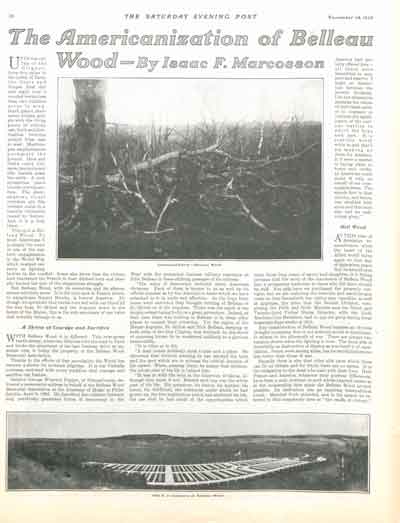The World Is Forced to Re-Evaluate America’s Military Power
In 1918, American soldiers showed allies and enemies that our military was equivalent to any in the world. And that America was about to become a significant player in global power.
The world didn’t know what to expect when America entered the First World War. America hadn’t yet proved itself among the old-world powers. Sure, we had beaten Spain’s colonial troops in Cuba and the Philippines, but we had yet to face a modern, motivated, successful army. Specifically, we hadn’t fought the German army, which had already defeated Russia and planted itself immovably on French soil.
Generals in France and England were looking forward to the fresh American troops we would supply them. They had little regard for the skill and organization of our fighting forces. They just wanted to throw our soldiers into their lines and continue the strategies that had already cost them millions of their own troops.
In June, 1918, they learned that America would be far more than just a source of manpower. America purchases this respect through a relentless, 25-day battle through a dense forest against an entrenched German position.
This proving ground was Belleau Wood.
“Thirty German divisions had been hurled against seven French and British division on a forty-mile front. The inevitable happened. Exhausted after weeks of incessant fighting, the French were compelled to fall back. For six days they had retreated disheartened and disorganized. Human endurance could stand no more. It was in this critical hour that the French high command decided to call on the Americans.”
The account is taken from “The Americanization of Belleau Wood,” by Isaac F. Marcosson, in the November 14, 1925 issue of The Saturday Evening Post.
“In their plunge to the south the Germans occupied the little towns of Belleau, Torey and Bussaires … Here they dug three line of trenches—the first was at the southern end—and installed scores of machine-gun nests. Lines of barbed wire and sharpshooter holes completed what was a strong natural defense due to the thick underbrush and heavy trees. “Garrisoned with infantry and alive with machine gunners, it was too strong a fortress to be allowed to remain in enemy hands. The Wood had to be cleared, and the task fell to the Marines, who, on June second, comprised the only American unit that had arrived on the scene.
“The French wanted to run the show, but [US Army] General Harbord asked to be let alone. He said, ‘Let us fight in our way and we will stop them.’ He won out and was given a free hand. Thus it came about that Belleau Wood was the first engagement in the war in which our troops went on their own.”
What followed was not the gallant combat of movies, but a grim, desperate struggle—a fight for survival as much as for victory. The Marines held their ground and slowly, slowly pushed forward. They came into the fight exhausted and under-equipped. They fought for weeks without reinforcements, suffering incredible casualty rates.
“The Marines … knew that it was up to them to stop the Germans and they did it. They went into Belleau Wood across a wheat field swept by a withering fire. Once inside those dim confines they stayed. From June second until the last German was routed out of the forest on June twenty-fifth, Belleau Wood was the scene of what was probably the bitterest hand-to-hand fighting in the war. Those silent aisles of oak, birch and pine witnessed deeds of individual heroism that in other conflicts would have stood out as epic feats. At Belleau Wood they were merely part of the day’s work.

by Isaac F. Marcosson
November 14, 1925
“The Marines did the job, but at heavy cost. In and around the Wood the slain were in the proportion of about one to every five wounded, while the usual battle ration is one killed to every seven or eight wounded. It means that many wounded soldiers remained in the fight until killed by a second or third wound.”
The Aisne-Marne American Cemetery was built after the war near the site of this battle. It holds the grave of 2,200 American soldiers killed in the fighting of 1918.
The original name of the region was Blois de Belle Eau, or the Woods of Beautiful Waters. In recognition of the sacrifice of our troops, France has permanently changed the name to The Woods of the Marine Brigade.
The First World War ended on November 11, 1918. The anniversary of that date has now become Veterans Day, honoring all veterans, of all wars.
On this day, we should remember the veterans among us, and the service they have performed for our country. Recognition and gratitude are never wasted in his direction. But we should also remember the thousands of Americans whose remains rest in 24 cemeteries around the world:
For more information on these cemeteries, and the battles with which they are associated, go to abmc.gov/home.php .